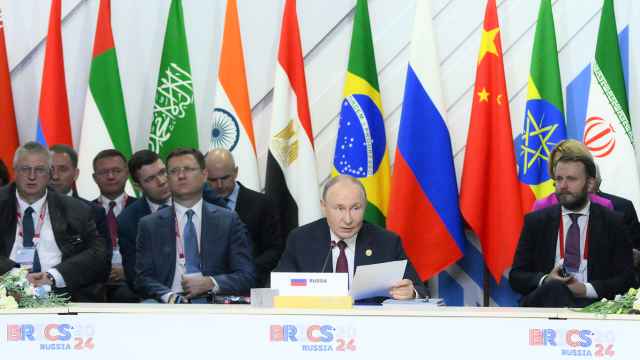Colonel General Sergei Beseda, head of the Fifth Service of the FSB, is being held in Lefortovo prison.
Beseda was placed under house arrest in March. Rumor had it that Beseda fell out with Putin – it was his Fifth Service of the FSB which was largely in charge of providing intelligence about the political situation in Ukraine and, more importantly, for cultivating political support for the Kremlin in Ukraine.
The FSB tried to downplay Beseda’s arrest, presenting it as a mere questioning of the powerful general. But now I’ve learned from my sources that this “mere questioning” didn’t save Beseda from a cell in Lefortovo Prison.
This is a good indicator of how the relationship between Putin and his beloved secret services had changed by the second month of the war.
The Fifth Service is the only department in Lubyanka that was created by Putin when he was director of the FSB. In 1998 Putin established a tiny directorate to supervise regional sections in charge of recruiting foreign nationals and gave the directorate a large mandate to spy in the former Soviet Union. In twenty years, it became the powerful Fifth Service, Putin’s chosen weapon to keep former Soviet countries in the Russian orbit. And it was run by one of Putin’s most trusted generals at Lubyanka, Sergei Beseda.
Beseda started his career in the Department of Counterintelligence Operations, the crème de la crème of the FSB. There Beseda was promoted to the position of deputy to Valentin Klimenko, the chief of the section in charge of countering CIA operations in Moscow. Ironically, Klimenko was also one of the main liaison contacts for Moscow's CIA station in the 1990s and the early 2000s.
In 2003 the tiny directorate created by Putin became a full department, and that was when I began to investigate its actions. The new department kept operating in the former Soviet Union but was also given a new sensitive task – to take over the role of Klimenko’s unit as liaison contact with the CIA. Beseda, as a former deputy of Klimenko, was transferred to the new department and put in charge.
The work of the department, later made into the Fifth Service of the FSB, was actually nothing but a series of diplomatic disasters. Beseda’s officers were caught red-handed everywhere, from Abkhazia to Moldova to Ukraine, where Beseda himself was present during the Maidan revolution. But Putin kept Beseda around — until this war.
There are several explanations for why Putin decided to throw Beseda under the bus now. Some say it’s due to the bad intelligence before the war. But inside the FSB most sources seem to think it was his failure to create and fund a pro-Kremlin opposition to Kyiv’s regime. In any case, that is being used in the official line of investigation, according to sources.
But those theories cannot explain why Putin decided to send Beseda to Lefortovo. Putin had plenty of other options. He could have fired Beseda, as he did with Roman Gavrilov, the deputy commander of the National Guard. Putin could have also transferred him to another agency, as he did with the powerful General Oleg Syromolotov some years ago, when he made him deputy minister of foreign affairs. Instead, Putin placed Beseda under a false name in Lefortovo prison – the only prison in the country under control of the FSB, a place with a gruesome reputation from the 1930s and 1940s. The prison still has an underground shooting range pitted with bullet holes made during Stalin’s purges when this cell was used for mass executions.
The most likely explanation is that Beseda’s Fifth Service was also still in charge of maintaining official contacts with the CIA. Many people in Moscow and the Kremlin have been asking themselves why U.S. intelligence before the war was so accurate. This might have added more to the already existing climate of paranoia. And when Putin gets paranoid, he starts looking for traitors in the places and institutions which are known to have official contacts with American intelligence.
That was the case in 2016, when Putin became paranoid about what the U.S. intelligence knew about his agencies’ interference in the U.S. election. Back then the Information Security Center of the FSB was purged, and the deputy head of the center, Sergei Mikhailov, who was officially in charge of sharing information with the Americans on cyber issues, was promptly sent to Lefortovo under a charge of treason.
In 2022, Putin is once again in a paranoid and angry mood, and Sergei Beseda is already in Lefortovo.
A Message from The Moscow Times:
Dear readers,
We are facing unprecedented challenges. Russia's Prosecutor General's Office has designated The Moscow Times as an "undesirable" organization, criminalizing our work and putting our staff at risk of prosecution. This follows our earlier unjust labeling as a "foreign agent."
These actions are direct attempts to silence independent journalism in Russia. The authorities claim our work "discredits the decisions of the Russian leadership." We see things differently: we strive to provide accurate, unbiased reporting on Russia.
We, the journalists of The Moscow Times, refuse to be silenced. But to continue our work, we need your help.
Your support, no matter how small, makes a world of difference. If you can, please support us monthly starting from just $2. It's quick to set up, and every contribution makes a significant impact.
By supporting The Moscow Times, you're defending open, independent journalism in the face of repression. Thank you for standing with us.
Remind me later.








